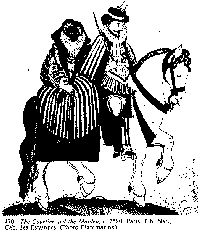

Travel is the lifeblood of the thriving Sixteenth century; it brings news, goods, and ideas from distant lands. It is also one of the greatest challenges of our age. Let's not forget that the root of the word travel is travailler, an Old French word meaning "to toil", and that the root of travail is the late Latin tripalium, which was an instrument of torture. Truly, travel is torture.
There is no good time of year to travel. During the Summer, plague and disease are at their height and cities are frequently closed to foreigners -- or worse, they are open and infected. In the Winter roads are simply impassable with snow, fallen trees, and ice. In the Spring and Fall, rains turn the unpaved roads into rivers of mud and at all times of year there is the double threat of either bandits or taxes.
Balthazar Paumgartner, a merchant from Nuremberg, dreads travel. In a letter to his wife (written in 1591) he writes:
...Thereafter the entire journey took a turn for the worse...Since then my brother Jorg, praise God, has also safely arrived with the convoy and our wares. So far no one who has arrived has been intercepted by foreign soldiers on the terrible, murderous road that leads here from everywhere.
It is difficult for us to judge the rate at which people traveled. When Balthazar completed the 180-mile journey from Nuremberg to Leipzig in five weeks, his wife Magdalena congratulates him on his speed and wise management of his affairs. Five miles a day, even with some stops for business, seems disastrously slow to the modern mind. Contrast this rate with the travels of Montaigne in about the same period.
For most travel is a hardship, at best a necessary evil. There are a few for whom travel is a delight. The most noteworthy of these is the essayist Michel de Montaigne. Between June of 1580 and December of 1581, Montaigne, four other nobles, and a variety of servants, traveled through France, Germany, and Switzerland, ultimately returning to Bordeaux.1 Montaigne was great lover of travel. In one of his essays, which were published in his lifetime, he writes:
The greedy appetite for new and unknown things indeed helps to foster in me the desire to travel, but enough other circumstances contribute to it. I gladly turn aside from my governing my house.
In his journal, Montaigne left tantalizingly explicit details of how long each journey took and how much distance was travelled -- but not enough of both to draw any conclusions better than estimates. Leaving from Vitry-le-Francois, the party "left Sunday morning after breakfast and came without stopping to Bar-le-Duc" a journey of about nine leagues (27 miles). The next day, the group travels only 4 leagues, but we are told that Montaigne is in poor health that day. One of the biggest problems encountered is the inconsistent use of "sup", "dine" and "breakfast". In some cases the party travels several leagues before breakfast; in others, 9 or 12 miles between "dining" in one town and sleeping in the next. Keeping all of that in mind, and bearing in mind that Montaigne was an incurable tourist, we can that a pace of 20 miles a day for a group of mounted men was not unusual, assuming nothing went wrong. Besides being dangerous, travel is expensive. Montaigne says "Traveling hurts me only by its expense, which is great and beyond my means". Montaigne's journeys are full of expenses, both planned for and unexpected. One of their baggage mules had an accident near Wangen (in Southern Germany). The replacement, a wagoner with four horses, cost the company three crowns -- for one day's work.2 At least the wagoner paid his own expenses out of his pay.
What sort of expenses might a traveler encounter? Plenty and they varied greatly by country and region.
| Le Poulet Gauche has three guest rooms, each with two beds (each bed large enough for two or three people) all on the upper floor. They are accessible by an exterior stair and share a common balcony which looks out over the inn yard. In addition to guest rooms, both M. du Lac and Gaucher have individual sleeping rooms on the ground floor. Gaucher's is off the common room, near the kitchen; M. du Lac's is near the private dining room. In a pinch, these rooms can be let as well. Jeanne Marie and the female servants sleep in a shared sleeping loft above the common room, under the eaves. |
Our whole lodgings, in which there were several rooms, cost only 15 sous a day. The landlords in all the places supply wood in the bargain; but the country round about is so full of it that it costs them only the price of cutting. The landladies are very good cooks. In the very crowded season these lodgings would have cost a crown a day [about 60 sou], which is cheap. The feed for the horses was 7 sou; all other kinds of expense equally reasonable. The quarters are not sumptuous, but very convenient; for by the use of many galleries [hallways] they make each room independent of the others. The wine and bread are bad.
1 - Montaigne kept a travel journal which was lost until almost two hundred years after his death. It's one of the great sadnesses of Le Poulet Gauche that we can base much of our knowledge around Montaigne's journals but cannot actually refer to them while in persona.
2 - Three crowns (écus) is about 10 livres, or very roughly one hundred 1997 dollars